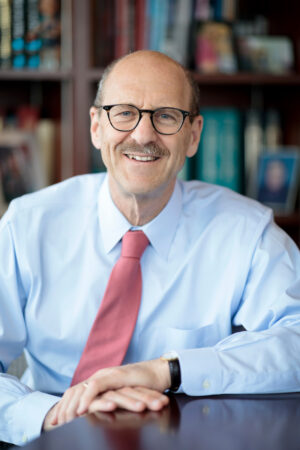About Dean Perlmutter
A national leader in the field of pediatric gastroenterology with decades of experience in academic medicine, David H. Perlmutter, MD, joined Washington University in 2015 as executive vice chancellor for medical affairs and dean of the School of Medicine.

David H. Perlmutter, MD, is the Spencer T. and Ann W. Olin Distinguished Professor, executive vice chancellor for medical affairs and George and Carol Bauer Dean of Washington University School of Medicine in St. Louis.
As dean of the School of Medicine, Perlmutter leads a $3.2 billion academic medical center. WashU Medicine is the third-largest research-intensive medical school in the U.S., with a $1.2 billion annual investment in basic and medical science research, one of the largest academic clinical practice groups in the nation, and a faculty that currently includes 16 National Academy of Sciences fellows, 28 members of the National Academy of Medicine, and 12 investigators with National Institutes of Health (NIH) MERIT status.
In his role as executive vice chancellor, Perlmutter is responsible for universitywide commercialization efforts, focusing on developing strategic industry partnerships in order to shepherd more of the university’s world-class research through the drug-development process. The goal is to translate as much laboratory research as possible into real treatments that will recognizably and concretely improve human health.
As a physician-scientist, Perlmutter is internationally recognized for his research on alpha-1 antitrypsin deficiency (ATD), a genetic disorder in which accumulations of a misfolded protein can cause severe liver damage. His work has led to advances in the understanding of how cells dispose of misfolded proteins that cause cellular dysfunction as well as the development of a pipeline of ATD drugs that could eliminate the need for liver transplantation in those with the disorder. Since drugs in this pipeline target and enhance autophagy, a cellular degradation pathway that is critical for the functioning of all cells and declines with age, they also represent exciting candidates for prevention of cognitive decline and other degenerative diseases of aging. Through his research, his team has recently discovered a lead candidate drug that targets a natural cellular pathway in a way that may slow, or even prevent, age-dependent degenerative diseases of the liver, heart and nervous system.
Perlmutter was trained at Children’s Hospital of Philadelphia and Boston Children’s Hospital and has been on the faculties of Harvard Medical School, University of Pittsburgh and Washington University in St. Louis. Prior to his current position, he was distinguished professor and chair of the Department of Pediatrics at University of Pittsburgh as well as physician-in-chief and scientific director at the Children’s Hospital of Pittsburgh of the University of Pittsburgh Medical Center.
Perlmutter is a member of the National Academy of Medicine and the American Academy of Arts and Sciences, past president of the Society for Pediatric Research, and past member of the Advisory Council of the National Institute of Diabetes and Digestive and Kidney Diseases. He has been honored with numerous awards throughout his career, including the E. Mead Johnson Award for Research in Pediatrics from the American Pediatric Society and the Sass-Kortsak Award for Pediatric Liver Research from the Canadian Liver Association. He has authored more than 200 scientific publications and holds 10 U.S. patents or patent applications.




